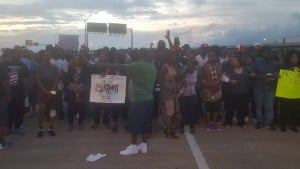 This post is part of the Ferguson Reflection: One Year Later series. If you have a reflection on Ferguson, please share it with us at [email protected]
This post is part of the Ferguson Reflection: One Year Later series. If you have a reflection on Ferguson, please share it with us at [email protected]
Standing in front of the oft-restored memorial to Michael Brown Jr. (I think it is important to remember the Jr. because it reminds us he had a father who loved him very much), a distinction came to my mind. It was the distinction between Michael Brown Jr. being “just another n*gger” and Michael Brown being “a n*gger that don’t mean sh*t to us.” The former is a description which is a creature of the discourses of the forces of domination and the latter a description which emerges from broken filial relations. The first is what we expect from the St. Louis County Police Department or the Ferguson Police Department. The second is what we might expect from a not insignificant majority of Christian folk in these here United States of America. The distinction between the socio-political description and theo-filial one is important to note because it helps us understand the space in which God plays whatever card She is pondering in this continuing wager with Satan.
While I have never been one much drawn to theological meanderings emerging from the vantage point of a “high” Christology, they are sometimes helpful. Here, again, noticing a distinction is important. Generally, high Christologies locate the importance of the Incarnation in the passion and resurrection of Christ. For this camp these moments reveal something important about ourselves, who we really are in relation to who we were meant to be, and about God’s real inclination and hope for us. These theologies take only passing notice of the things that Jesus did because the far more important thing is to notice what the Incarnation reveals. This does have it merits because folks like me who hold onto the other Christology, a “low” Christology, have to be apologists for a Savior who made it a practice of looting the grain fields of land owners with his crew, destroying the businesses of merchants in his own and others communities, always looking to have more wine at the party so he and his boys could get crunked, and always, I mean always, hanging with shorties. There are times though, that a high Christology has a value beyond absolving one of the need to apologize for the “person” of Jesus. That value is that it draws our gaze to the terms of the passion and therefore, what it is that God is precisely doing in the resurrection.
It is good for us to remember that the passion happened on a cross, which means the political authorities were finally the authors of Jesus’s death. Given what we now understand to be the ubiquity of crucifixion in the Roman Empire it is clear that this mode of execution demonstrated that he was “just another Jew” to them. We should also remember that our scripture really magnifies the importance of Jesus to the local religious authorities beyond what was probably the case. For, if he had been that important, the authorities would have stoned him as they did Stephen. The fact that they did not means that in their eyes he was “a Jew that don’t mean sh*t to us.” So, keeping our eye on the passion recalls for us that whatever else God was doing in the resurrection She was responding to the state sanctioned killing of a cat whose only importance was to the people who loved him; who was eschewed by the “respectable” people in his own community, and who in death was the subject of all manner of calumny and slander; and who in the end had brought all of this on himself.
Whatever else God was doing in the resurrection, we do know that Her response to the killing of just another Jew that didn’t mean sh*t to important religious people was made materially real by the calling into being of a rag tag community of the privileged and the poor, the upright and the ambiguous, the weak and the strong whose only common conviction (a conviction by the way that gave them strength to walk into the teeth of the greatest empire of the moment and the reigning religious authorities of the hour) was that what Jesus the Christ had revealed in his passion and resurrection was this: If God got us, we gon’ be alright.
Rev. Dr. Stephen G. Ray, Jr., serves as the Neal F. and Ila A. Fisher professor of systematic theology at Garrett-Evangelical Theological Seminary. He is also the author of Do No Harm: Social Sin and Christian Responsibility.












